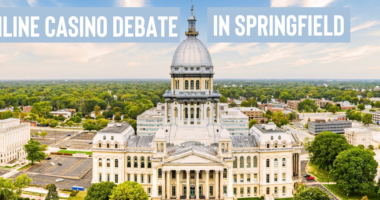Illinois Online Casino Legalization Inching Closer To Reality

Go directly to the main content.

A bill to legalize online casinos in Illinois is advancing through the legislative process, with a possibility of passing before the end of the Illinois General Assembly session on May 19.
On February 8th, Representative Edgar Rodriguez brought forth HB2239, also known as the Illinois Internet Gaming Act, in the House. The bill has now advanced to the House Gaming Committee where it is being reviewed alongside 10 other bills. It is important to note that the bill has only completed one reading out of the required three.
The Senate version of the Internet Gaming Act, introduced by Senator Cristina Castro as SB1655 on Feb. 8, is currently stalled in the Senate Executive Committee, which is chaired by Castro.
Furthermore, Representative Jonathan Carroll’s HB2320, another proposed Internet Gaming Act bill, has not made any progress since its submission on February 14.
Illinois one of three states with active online casino legislation
However, Illinois is one of just three states with legislation in place that could lead to the legalization of online casinos in 2023.
Currently, there are active bills in New York and New Hampshire that could potentially legalize iGaming in 2023.
Currently, six states offer legal online casinos.
- Connecticut
- Delaware
- Michigan
- New Jersey
- Pennsylvania
- West Virginia
Moreover, Ontario, located across the Canadian border, has officially legalized online casinos and sportsbooks in 2022. Currently, there are a total of 46 live gaming operators in the province.
Responsible gambling clearly on Illinois lawmaker’s minds
The Illinois legislation will gather momentum by incorporating a robust responsible gambling element.
Carroll’s bill stands out for including a provision that designates $10 million from the tax revenue generated by the State Gaming Fund under this Act to be allocated each year to the Department of Human Services. This funding is specifically earmarked for the management of programs aimed at addressing problem gambling.
An additional $10 million annually would certainly be advantageous. In fiscal year 2021, Illinois ranked as the 11th highest state in the US in terms of per capita public funding for problem gambling services. The state allocated $6.8 million, approximately 0.5% of its $1.358 billion tax revenue, towards responsible gambling initiatives.
Senator Bill Cunningham proposed SB1508 in the Illinois Senate to amend the Sports Wagering Act. The bill would require online sports wagering licensees to show a pop-up message guiding individuals to gambling addiction assistance websites after every ten online bets placed by a single person.
Furthermore, the Internet Gaming Act includes various measures to promote responsible gambling at Illinois online casinos, including:
- The Illinois Gaming Board must create responsible gaming initiatives, such as implementing a statewide gaming database that tracks individuals banned from gambling.
- Ways to verify that gambling customers are of legal age (21 years old).
- All gaming websites are required to display the statement, “If you or someone you know is struggling with a gambling problem, assistance is accessible. Call (toll-free telephone number)” or an approved variation specified by IGB.
- All gaming apps are required to include options for both temporary and permanent self-exclusion.
Illinois online casinos bill calls for a license fee of $250,000, taxed at 15%
Both the Senate and House bills allow online casino operators in Illinois to offer up to three different Internet gaming brands. These operators are required to pay a licensing fee of $250,000, with a renewal fee of $100,000 every four years. The tax rate outlined in both bills is 15%.
Specifically, the tax revenue will be directed towards the State Gaming Fund, which supports the Illinois Gaming Board’s operations and contributes to the general funds designated for education expenses.
Notably, the entrance fee for the market is considerably lower than the current price of a sports betting license in Illinois.
For any new casino or track looking to offer sports betting, they must pay a minimum of $5 million for a license. If operating a sportsbook at a professional sports facility, the license fee is $10 million. Additionally, there are three online-only sportsbook licenses available at a cost of $20 million each, which do not require affiliation with a physical casino.
Illinois is currently losing more than $100 million a year to the black market
In January, Play Illinois projected that Illinois could lose out on $105 million annually in tax revenue if it did not legalize online casinos.
According to a study conducted by The Innovation Group at the request of the American Gaming Association, it was found that illegal online casino sites in the black market cause the US to lose more than $4 billion in taxes each year.
Illinois is in need of additional revenue and in accordance with Governor JB Pritzker’s economic priorities, Play Illinois has suggested five potential ways to allocate the revenue generated from online casinos.
They are:
- Decreasing Illinois’ massive pension liability of $140 billion
- Raising the allocation for child care funding
- Providing tuition-free higher education to low-income families within the state.
- Continuing on the path of financial responsibility
- Attracting major companies to Illinois
Opposition likely to come from VGT advocates
Additionally, the legalization of online casinos in Illinois is further complicated by the state’s status as having the most lucrative video gaming terminal market in the nation.
Illinois has about 44,000 VGT units spread out in roughly 8,200 locations. The annual tax revenue from VGTs is quickly approaching $1 billion, surpassing retail casinos and becoming the top revenue-generating gaming format in the state.
Additionally, the many small businesses throughout the state that depend on VGT revenue will not easily give up their business to online casinos without a fight or fair compensation.
Monitor Play Illinois as we follow the progress of all Internet Gaming Act bills in the Illinois legislature.






